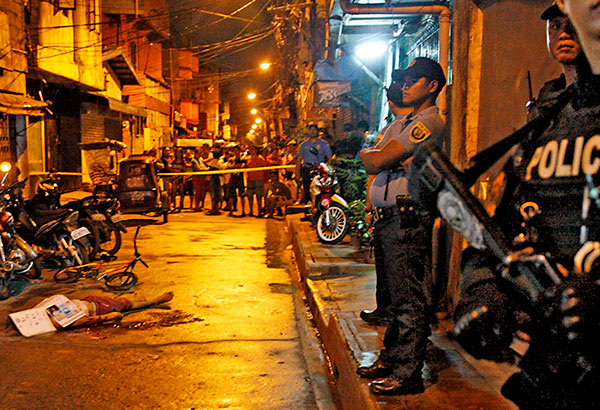Despite decrease, majority still believe gov't applying law equally

Local and international opponents of the government's drug war claim that only the poor are primarily targetted in the campaign and the campaign has let the big-time suspects go free. Joven Cagande, File
MANILA, Philippines — Despite a significant decrease, a majority of Filipinos still believe that the administration of President Rodrigo Duterte is enforcing the law equally, the latest survey by polling agency Pulse Asia shows.
According to the agency's September 2017 Nationwide Survey on the Performance Ratings of the Duterte Administration on Selected Issues, 67 percent approve of the government's efforts to apply the law equally, lower by seven points than in June.
Between June and September, more people have become undecided on whether the Duterte government is able to equally apply the country's laws although this change is insignificant as it falls within the survey's error of margin of + 3 percentage points.
READ: Rody satisfaction, trust ratings down
Disapproval rating in this issue also hardly changed, from 6 percent in June to 7 percent in September.
"For the period June to September 2017, the only significant change in the national administration’s performance ratings is the decline in the level of appreciation for its efforts to enforce the law equally on all citizens (-7 percentage points)," the research agency said.
The Duterte administration also saw declines in the areas of fighting corruption and criminality, according to Pulse Asia, but these fell short of being considered significant because of the survey's error of margin.
In fighting criminality, the approval rating of the government went down from 84 percent in June to 78 percent in September. The number of undecided individuals over the government's campaign against criminality meanwhile went up from 11 percent in June to 16 percent in September.
READ: Duterte sees 18-point drop in satisfaction rating
The administration's rating in fighting corruption also dipped by six points, from 76 percent in June to 70 percent in September.
There was also an increase in the ambivalence of the public in the government's actions to combat graft and corruption in the country, from 15 percent in June to 21 percent during the latest survey period.
These areas were the three main pillars of Duterte's platform during last year's national election.
The chief executive, who often takes criticisms of his flagship programs and policy initiatives personally, promised a ferocious anti-drug and anti-crime campaign that local and international human rights groups have criticized for the mounting number of deaths and human rights violations it has left on its trail.
Uncertainty over the peace initiatives of the administration also went up by six points, from 20 percent in June to 26 percent in September, as Duterte essentially froze government talks with Maoist rebels aimed at ending one of the longest insurgencies in the world.
Despite these decreases, Pulse Asia noted that most Filipinos still approve of the performance of the administration in these areas as well as in responding to the needs of those affected by calamities, protecting the welfare of overseas Filipino workers, protecting the environment, defending national territorial integrity, creating more jobs and increasing workers' pay.
The only areas where the administration failed to achieve majority ratings were poverty reduction (49 percent) and inflation (45 percent), which is the top urgent national concern of five in 10 Filipinos.
"Levels of disapproval for the administration’s handling of these 12 selected issues range from 3% on disaster response to 21% on inflation while levels of indecision on the matter vary from 16% on criminality to 36% on poverty reduction," it said.
The Pulse Asia poll came a day after another survey firm, the Social Weather Stations, reported that the public's satisfaction with the performance of the administration dipped by six points, from +58 (71 percent satisfied, 13 percent dissatisfied) in June to +64 in September.
Despite the drop, SWS said that the administration's rating remained on a "very good" level.
However, the two agencies have different means in computing their approval and satisfaction ratings. SWS subtracts dissatisfaction rating from satisfaction rating to obtain its net approval rating, but Pulse Asia does not.
The Pulse Asia poll also listed controlling inflation as the most urgent national concern among Filipinos.
Fighting criminality is the most important issue in almost four in 10 Filipinos while fighting graft and corruption is the most urgent among 28 percent of the public.
The field work for the Pulse Asia survey was done from Sept. 24 to 30 using face-to-face interviews with 1,200 adults. Its confidence level is at 95 percent.
Some of the key issues during the conduct of the poll were the Senate investigation into the P6.4 billion worth of methamphetamine which slipped through Manila's ports and the alleged involvement of the president's son and son-in-law in the transaction, the filing of an ethics complaint against Sen. Antonio Trillanes IV, the denial of the police that there were extrajudicial killings in the Philippines and the trade of accusations between Trillanes and Duterte about foreign and local bank accounts containing questionable wealth.
- Latest
- Trending




























